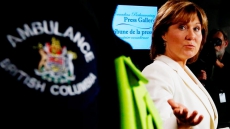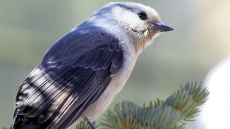VANCOUVER — Calling someone a junkie was once the norm, but many people who use illicit drugs and those who treat them say the word addict is just as stigmatizing.
At the Crosstown Clinic, which provides pharmaceutical heroin treatment for people hooked on the opioid, someone has crossed out "addicts" on a notice posted by a group called the Addicts Union and substituted "patients."
Dr. Scott MacDonald, lead physician at Crosstown, said the Diagnostic Statistical Manual of Mental Disorders no longer lists the term addict.
"In the most recent version, I won't even say it, the A word is not even in the professional language anymore," he said in the cramped lobby of the clinic, which follows Switzerland's example in providing pure heroin as a treatment option.
"For me, it's helpful," MacDonald said of the changing language around substance use. "If I walked in and said, 'I'm an addiction specialist and you're an addict,' that sets up a dynamic."

The BC Coroners Service said 914 people fatally overdosed in British Columbia in 2016, with fentanyl being the culprit in many of the deaths. The service said 90 per cent of the people died indoors, most in private residences.
Just down the street from Crosstown at a flea market in Vancouver's Downtown Eastside, Michael Totten, 44, said his life spiralled into illicit drug use after he was prescribed the painkiller Percocet following a back injury.
Totten, who lost his home and now lives in a shelter after enduring the "nightmare" of a filthy single-room occupancy hotel, said many people driven to using drugs have suffered severe trauma and fear they'll end up dead from unwittingly taking the opioid fentanyl, so they shouldn't be defined by their behaviour.
"I think if people could hear some of the horror stories they'd be ashamed of how they have stereotyped users," Totten said as police, fire and ambulance sirens rang out in the area that was once known as skid row.

MacDonald said people who chronically use illicit drugs are now considered to have a substance-use disorder, not an addiction, which is more stigmatizing.
"They're just people with a medical problem, a chronic disease that's manageable with treatment," he said, adding clients at Crosstown have tried an average of 11 other methods in their effort to quit using drugs.
An Amsterdam-based advocacy group calls itself the Junkie Union, but only because people chose to apply the term to themselves, said Jordan Westfall, president of the Canadian Association of People Who Use Drugs.
"It can be a powerful sort of reclamation of a term but as far as an external, I think these terms, like junkie and addict, they reduce an entire life, an entire human being, into a behaviour that society has deemed problematic," he said.
"I refer to myself as a person who formerly used opioid drugs," said Westfall, adding he was a university student who came close to becoming homeless before quitting OxyContin, fentanyl and heroin to pursue his goal of getting a master's degree in public policy so he could advocate for reform to help others.
Loaded terms are often dropped to suit an evolving society, said Ruth Derksen, a former English professor who specializes in the philosophy of language at the University of British Columbia.

"Language shapes our perception and reality and the way we see the world," she said, adding the negative term "juvenile delinquents" was changed in the 1990s to "kids at risk" to describe troubled children and youth needing help.
Derksen noted pejorative words were once used for people suffering mental illness.
Saying that someone has a substance-use disorder rather than calling them an addict is an example of understanding their struggles and needs, she said.
"It's like putting on another set of glasses and suddenly we see the world differently because the language has shifted."




